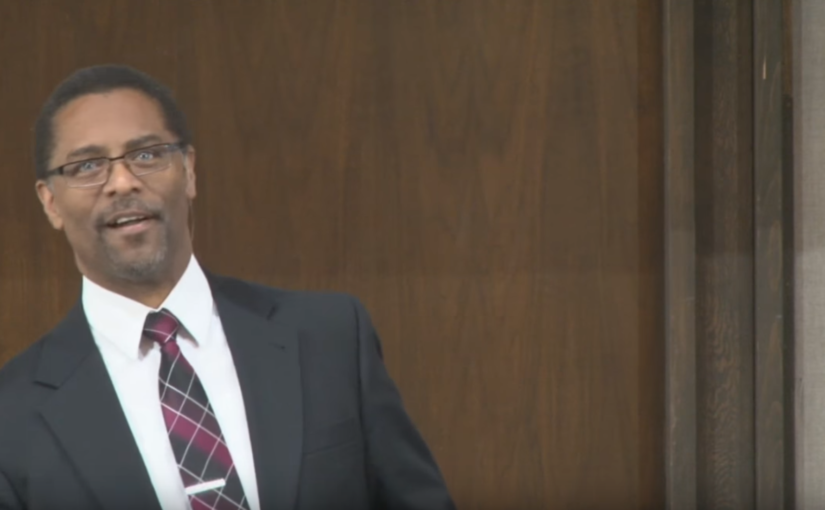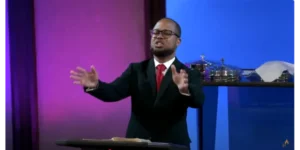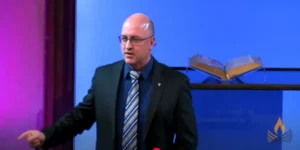Do you know who you are…and whose you are? On Sabbath our topic was “Identity Theft” and the spiritual deception that Jesus warned about in the last days.
Rewind to Matt. 24:3-4. The first sign that Jesus says will indicate the end is near is identity theft. And it’s His identity that will be stolen! “Many,” He says, “will come speaking for me, proclaiming ideas that supposedly have my endorsement.” Christ claimed to be the way, the truth and the life. No one comes to Father but by me. But others will come claiming to be a new way, with a new truth for a new life.
In the garden God spelled out one way to live forever—in obedience to Him. Satan introduced another way—defiance of Him packaged as enlightenment with his blessing, rather than his curse. This was the deception at the beginning and Jesus says it will be repeated at the end.
Rewind to Genesis 3:1-5 and witness identity theft in progress. Satan comes disguised as a creature who has disregarded God’s commands and has been rewarded with the gift of speech.
“You will not surely die,” he tells Eve, “for God knows that when you swallow this you will be equal to him, able to make up your own story and determine your own identity, make your own rules and be your own God. And there will be no negative consequences for doing so because God loves not hates, creates not destroys. You can exercise your rights, disobey him and he’ll love you anyhow.” This was a half-truth. God will love you anyhow, but His love won’t nullify what He said about the fatal side effects of consuming that which He said was deadly.
“Satan tempts men to disobedience by leading them to believe they are entering a wonderful field of knowledge. But this is all a deception. Elated with their ideas of progression, they are, by trampling on God’s requirements, setting their feet in the path that leads to degradation and death.” (Patriarchs & Prophets, p. 55)
Ultimately all false gods—even the ones of radical individualism and digital capitalism—take their worshippers to the worship of themselves. It was E.M. Bounds who said, “Somehow self and not God rules in the holy of holies.”
The gods of the age are obliterating all structure or authority that went before. It is a deconstructing of any ideas of authority, gender, and sexuality. Left and right aren’t polarized; they’ve actually joined together to create a kind of human who is absolutely unbounded, who lives in liquidity; who doesn’t know who they are and who then can be sold stuff. And what stuff are we being sold? Self-worship.
We’re either worshipping God or worshipping something else. Worship is what the final crisis is all about. (See Rev. 13:4, 8, 12, 15; cf Rev. 12:9.) This power is connected with Babylon, derived from “Babel,” where God confused the languages. Babel means confusion. It was a tower erected in defiance of God’s authority, power, and promise—a monument to self-determination and pride. (See Gen. 11:4.)
In Rev. 14:8 we read that Babylon as a rival system of worship has failed. “Adulteries” symbolize false doctrines. But the language reveals that Babylonian worship is sexualized somehow. In chapt. 17 Babylon is personified as a harlot who has attempted to steal the identity of God’s true church. The golden cup she holds is filled with “abominations” and “adulteries.” And the nations are pictured in 18:3 as having drunk “the maddening wine” of her adulteries.” It’s as though humanity has been slipped a date-rape drug, been morally assaulted, and had its identity stolen while under the influence. No one seems to know who they are or Whose they are!
In the secular “temples” of today, confusion reigns. Confusion in the economy, the government, the press, race relations, law enforcement, religious liberty and free speech, immigration, religion versus relationship, the law versus grace, left versus right, evolution versus creation, and confusion over sexuality and gender. And oh, the confusion and hurt over this last one! It’s so sensitive, we don’t even want to touch it.
So how does God restore what the enemy has stolen? Rewind to Rev. 14:6-7. The first angel’s message and the Sabbath speaks to the individual who has lost their identity in this age of digital consumerism. Identity, belonging, history, and destiny is recovered in finding the Creator, much like when an adopted child searches and finds his birth parents. Suddenly there is a finding of my place in history. I have context and therefore, meaning. The first angel’s message is not just a reform message but a revival message.
The three angels’ message speaks right into this cultural moment. In the last days, God wants to restore our true identity by reconnecting us with our Creator. When people are worshipping everything and nothing at the same time, God calls us to “Worship Him who made the heavens, the earth, the sea, and the springs of water.” And worship of the true Creator God is facilitated through the Sabbath which is in the heart of the ten commandments and begins with the world “Remember.” Why? Because in this age of deception and viral idolatry, the Sabbath is the connecting DNA that seals us to our true “birth” Parent. (See Ex. 20:8-11.)
This commandment, ironically, is connected with rest—again something only Jesus can give. The gods of secularism, individualism, and consumerism have left people cynical, frustrated, and empty. Only Jesus says, “Come to me, all you who are weary and burdened, and I will give you rest. Take my yoke upon you and learn from me, for I am gentle and humble in heart, and you will find rest for your souls. For my yoke is easy and my burden is light.” (Mt. 11:28-30)
When it comes to the confusing gender and sexual identity landscapes, how do we reconcile the tension between God’s love for all, and His standard of holiness that extends to the core of who we are? Jesus is in the business of recovering stolen identities. Here’s how He does it:
L – Love. (Jer. 31:3; John 15:13; John 3:16)
G – Grace – (2 Cor. 12:9) Sufficient for all and every sin. Why do we need grace? Because all have sinned. No sin; no need for grace.
B – Bible –We’re suffering from truth decay. Lawyers and politicians say truth isn’t truth. The word is truth. (John 17:17; Psalm 119:9, 10)
T -Transformation – The one we neglect the most. We love talking about love and grace and even the Bible, but those three produce the fourth–transformation of holiness. (2 Cor. 3:17-18; 5:17)
By beholding we become changed (transformed). Not by beholding the new gods of digital capitalism or progressive sexuality in the temples of secularism, but by beholding Christ and Him crucified. The cross is the ultimate example of selflessness. Now, through faith, the power of the resurrection is available to restore our true identity. (See John 1:12, 13; Rom. 12:2.)
At the end of time many will come knocking on your heart’s door wanting to come in—many posing as Christ himself, coming in his name. But only One wants to come and fellowship with you. All others are seeking to steal, kill and destroy. “I have come,” says Jesus, “that they may have life and have it to the full” (John 10:10). And coming to Him is how we get our identity back.—Pastor Randy





